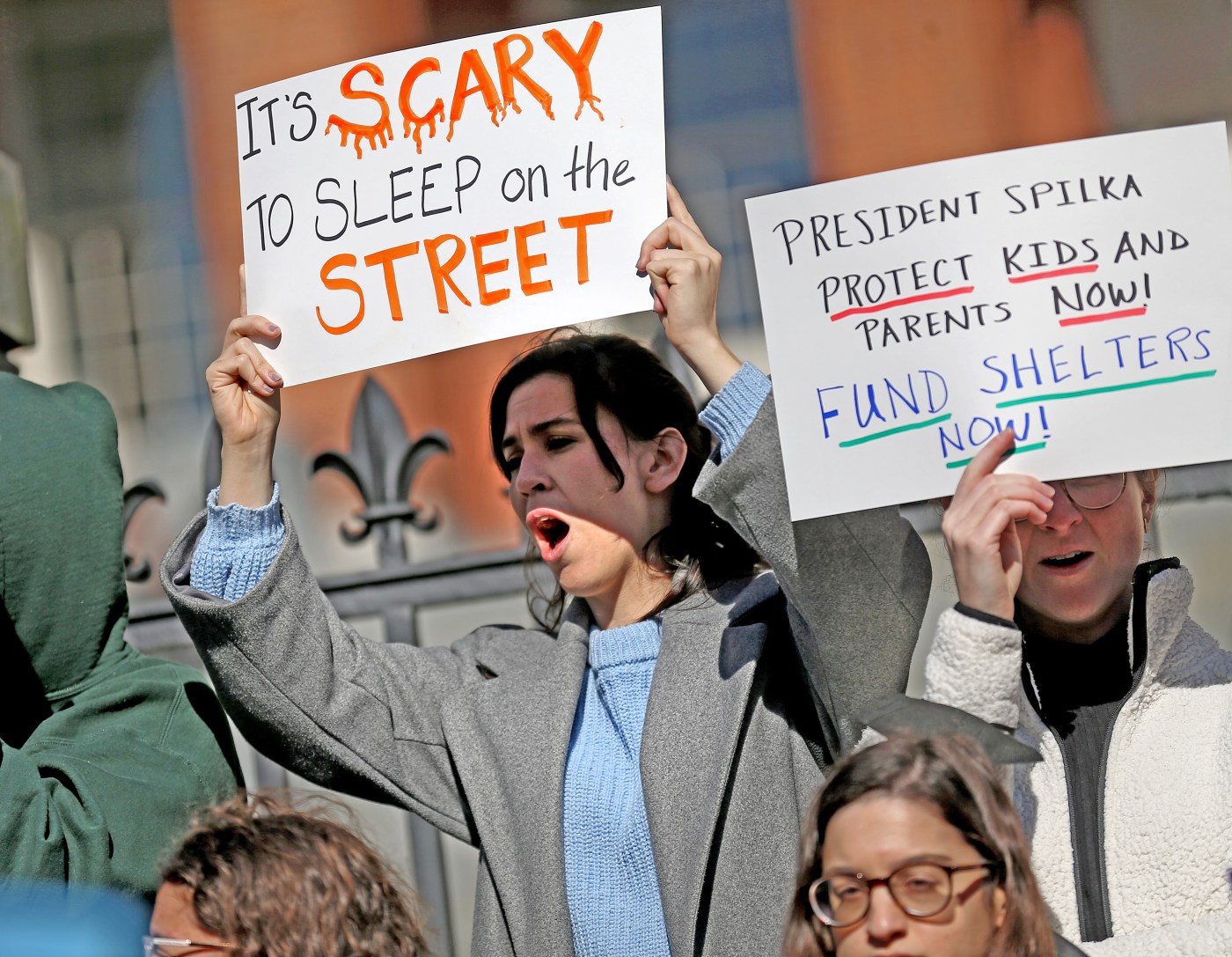
Massachusetts judge takes appeal to governor’s shelter cap under advisement
A Suffolk County judge did not make an immediate ruling Tuesday afternoon on a Healey administration plan to cap the number of families in emergency shelter, saying a decision could come Wednesday as the state barrels closer to a capacity limit the governor has outlined.
Lawyers for Civil Rights filed a lawsuit last week and requested a preliminary injunction on the self-imposed emergency shelter capacity limit, a move that riled homeless and housing advocates who said it will force some families to live outside as colder weather sets in.
But Gov. Maura Healey and the state’s housing department argue Massachusetts has neither the funds, capacity, nor personnel to keep expanding the emergency shelter system through a sweeping network of hotels and motels. State officials projected capacity could be reached as early as Wednesday.
In court, Lawyers for Civil Rights Attorney Jacob Love focused on a requirement in the fiscal 2024 state budget that the administration must produce a report for the Legislature 90 days before making any regulatory, administrative practice, or policy changes that “would alter the eligibility of benefits” under the emergency assistance shelter program.
Assistant Attorney General Kimberly Parr argued the Legislature was well aware of the issues facing the shelter system because Healey filed a $250 million funding request for emergency shelter and declared a state of emergency.
Parr argued there is debate over whether the 90-day notice provision in the state budget applies to emergency circumstances and said emergency regulations issued earlier in the day do not make changes to emergency shelter eligibility.
“To start with the facts on the ground, this is no surprise to the Legislature or to the people of Massachusetts,” Parr told Judge Debra Squires-Lee. “… The balance of the harms and the public interest really weigh against granting the injunction.”
Healey said earlier this month the shelter system can handle no more than 7,500 families, and those who apply for temporary housing after the cap is reached will be placed on a waitlist, a process the administration moved Wednesday to make permanent through emergency regulations.
The lawsuit from Lawyers for Civil Rights argues the Healey administration plans to “artificially cap” the emergency shelter system, place families on a waitlist rather than find them accommodations, and prioritize them with “certain yet-to-be-defined ‘health and safety risks.”
“These changes will necessarily delay the provision of benefits to shelter-eligible families, such as plaintiffs and those similarly situated, thereby denying them shelter and perpetuating the myriad harms caused by homelessness,” the lawsuit said.
There were 7,332 families living in emergency shelters as of Monday, according to data from the Executive Office of Housing and Livable Communities. More than 3,630 families were in traditional shelters, 3,622 in hotels and motels, and 77 in temporary sites like Joint Base Cape Cod and a Quincy college dorm.
The lawsuit and the move to cap the number of families in emergency shelters stems back to the state’s decades-old right-to-shelter law, which guarantees temporary housing for eligible families with children and pregnant women.
The law has come to cover the thousands of migrant families — often fleeing unstable and dangerous conditions in their home countries — who have arrived in Massachusetts over the past year.
The Executive Office of Housing and Livable Communities filed emergency regulations with Secretary of State William Galvin early Wednesday that call for a written declaration outlining the maximum number of families allowed in the system and the procedures necessary to administer and maintain a waitlist.
The declaration would need to identify a maximum program emergency shelter system capacity “which the director (the secretary) determines the shelter system can attain and that the shelter system shall not be required to exceed during the term of the declaration,” according to a copy provided to the Herald.
“The declaration shall have an initial time limit of 120 days after it is issued but may be extended for additional periods of up to 120 days if the Director (the Secretary) determines that the shelter system is still unable to meet all current and projected demand for shelter from eligible families in light of legislative appropriations,” the proposed regulations said.
During a radio interview before the court hearing, Healey said her administration filed the emergency and a declaration was released before the court hearing Wednesday.
“I continue to call for relief from the federal government. We need help with staffing. We need help with funding. And again, it’s a federal problem that we’re having to deal with as states,” Healey said on WBUR.
Some shelter providers have backed the emergency shelter cap, saying a system designed to handle about 3,000 families each year has been pushed to its limits by a surge of migrant arrivals from other counties.
But there are other opponents to the shelter capacity rule, and some rallied outside the State House before lawyers took to court only blocks away.
Massachusetts Coalition for the Homeless Associate Director Kelly Turley said the Healey administration must put a pause on its plan to create a waiting list for shelter and “uphold the 40-year-old” right-to-shelter law.
“And we’re calling on the Legislature to immediately appropriate the funds that are needed to continue not only the expansion of the emergency assistance family shelter program, but also making deeper investments in long term housing resources for children and families, to make investments in homelessness prevention resources,” Turley said outside the State House.
This is a developing story…


